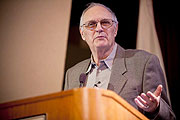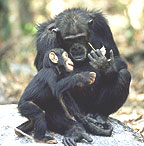Alan Alda Brings Passion for Communicating Science to Brookhaven Lab
by Scott Mandia, Global Warming -- Man or Myth? blog, April 11, 2010
The science of climate change and even the scientists themselves are under attack from a well-orchestrated and well-oiled misinformation campaign. The best defense against this anti-science offensive is to make sure that the correct message reaches a wide audience. Chris Mooney and Sheril Kirshenbaum in their book Unscientific America: How Scientific Illiteracy Threatens our Future explain that scientists have failed to get their message across for a variety of reasons but mostly because we are not engaging the public on their turf. After reading that book, I became a climate change evangelist with my Global Warming: Man or Myth? website, this blog, and more recently a Facebook Fan Group called Global Warming Fact of the Day. I have two small children and I do not like the future that I see for them or for their children in a human-driven warmer world. As I travel the blogosphere and as I watch television, it is quite apparent that Moody and Kirshenbaum are on to something. Scientists have fallen quite short of being the expert communicators that they must be for no less a reason than our future is at stake. Obviously we have much to learn.
I was fortunate enough recently to attend the Communicating Science Workshop sponsored by Stony Brook University Center and Brookhaven National Laboratory where Alan Alda gave the keynote address. The agenda for the workshop can be viewed here. Participants were able to attend three breakout sessions. I attended the following: Distilling Your Message, Using Newer Media, and Interacting with the Media. I came away from this workshop with many valuable tips and tricks to be a better science communicator and I will use this blog post to share these gems with you.
Alan Alda
Well, we all know he is a famous actor. He won six Emmys for his role as Hawkeye on M.A.S.H. and he has starred in countless film and television movies. What I did not realize is how passionate he is about communicating science.
According to the Center for Communicating Science Web site:
Alda, the longtime host of PBS’ “Scientific American Frontiers” and a passionate advocate for solid popular science, has been leading an innovative effort to help scientists connect better with the public. Through the Center for Communicating Science, Mr. Alda has been teaching science graduate students to play improvisational theater games. The goal is not to turn them into actors, but to free them to talk about their work more spontaneously and directly, and to connect personally with their audience. Early reports from students say the workshops helped them in teaching, defending a thesis, and simply explaining their research to people outside their fields.
Alan spoke to a packed house and began his story by telling us that he used to sneak into his neighbor’s garage as a kid to build motors. When he went to high school, it was understood that one could either go into the sciences or into the arts. These areas were thought to be mutually exclusive ala C.P. Snow’s The Two Cultures. Because he chose art he was not exposed to the “language” of science even though he always had the curiosity for science. While in his 20s he began to read Scientific American and started to learn this language. In his words he said “the magazine spoke to my curiosity.”
One day, he was asked if he would like to host Scientific American Frontiers, the television companion to the magazine. Alan told the producers that he did not want to just introduce the scientists but he wanted instead to have a real conversation with the guests. The show was a huge success because the audience saw Alan really trying to understand the science, and Alan was not shy about saying “I don’t get it.” Because the show was essentially a conversation with an “ordinary person,” the scientists were more relaxed, spoke in a simpler language, and their true passion for the science was observed by all. Alan remarked that he did his best work on that show! Quite a surprise given the long track record of Alda’s accomplishments in acting.
Alan then segued into how to effectively communicate science today in three major areas:
1. Public at large: He stated that “The public is on a blind date with science.” Neither side really knows much about the other and both need to put their best side forward right away or the date is over. He lamented the fact that twice as many Americans believe in the devil than in the theory of evolution. Evolution needs to be presented as more compelling than the devil if we wish to keep “dating.”
2. Policy-makers: When requesting funds or summoned to explain the science that may drive policy, scientists often forget that their audience does not understand science jargon. Science cannot progress if these folks do not understand the value of the science and therefore nix the funding that drives it. Alan said metaphorically that it is typical for these scientists to “tell us who the killer is before we even know that there has been a murder! Talk about the murder, the blind alleys along the way and how the murderer was finally apprehended. Tell us the story and not just about the data!”
3. With other scientists: Scientists all have jargon specific to their discipline and often forget that when speaking to other scientists from outside their arena, they are likely losing their audience in the discussion. (Climate science is probably the best example of where we need to communicate better between the hundreds of disciplines that supply the missing pieces in the climate change puzzle.)
Alda then told the audience that his greatest dream is that communication skills, both verbal and written, become a core part of every science curriculum instead of an “extra” that gets little merit. He used a wonderful analogy to highlight the problem. When humans speak, we look at each other in the eye and ask “look at me, do you get it, do you get it?” When a mother chimp teachers her child how to get bugs out of a hole in a tree, she sticks in the tool, gets a bug, and then eats it. All the while the baby chimp watches what she is doing intently but never looks at the mother. Alan told the audience “be less like chimps and more like humans!”
Alan then wrapped up his talk by comparing science to “the three stages of love: lust, infatuation, and commitment.” Lust is what humans feel immediately when viewing somebody attractive. We send signals and pick up on body and voice tone. Nobody is ever in lust with a “lecture.” Alan wants scientists to get out of our lecture mode and begin showing their passion by telling our story. Next is infatuation. He told us that research shows that anything that evokes emotion will cause remembrance. Again, scientists need to reveal their passion in order to evoke emotion with their audience to get the science “sticky.” Finally there is commitment – recognizing the value of information. When this point is reached, listening to one other becomes second nature and we are able to figure out what the other person is thinking. For science, this is the long-term goal. Can the public and scientists become committed to one another? This can only happen after the first two stages are achieved.








